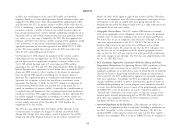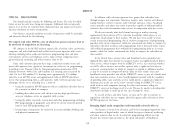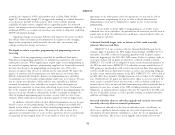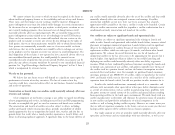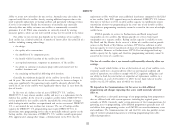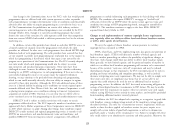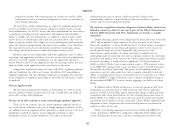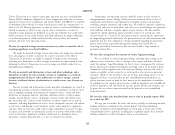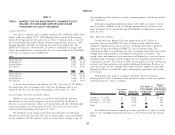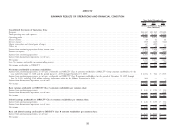DIRECTV 2010 Annual Report Download - page 45
Download and view the complete annual report
Please find page 45 of the 2010 DIRECTV annual report below. You can navigate through the pages in the report by either clicking on the pages listed below, or by using the keyword search tool below to find specific information within the annual report.DIRECTV
Any change in the Communications Act or the FCC’s rules that would permit programmers or unduly influencing such programmers in their dealings with other
programmers that are affiliated with cable system operators to refuse to provide MVPDs. The conditions also require DIRECTV to engage in ‘‘baseball style’’
such programming or to impose discriminatory terms or conditions could materially arbitration if elected by an MVPD where the parties cannot agree on terms and
adversely affect our ability to acquire programming on a cost-effective basis, or at conditions for carriage of RSN programming owned, managed or controlled by
all. The Communications Act prohibitions on certain cable industry exclusive DIRECTV. This condition continues to apply to the three RSNs DIRECTV
contracting practices with cable-affiliated programmers were extended by the FCC acquired from Liberty Media in 2009.
through October 2012, though it is currently considering proposals that could
shorten the term of this extension if a cable operator could show that competition Changes to and implementation of statutory copyright license requirements
from new entrant MVPDs had reached a sufficient penetration level in the relevant may negatively affect our ability to deliver local and distant broadcast stations,
marketing area. as well as other aspects of our business.
In addition, certain cable providers have denied us and other MVPDs access to We carry the signals of distant broadcast stations pursuant to statutory
a limited number of channels created by programmers with which the cable copyright licenses contained in SHVA.
providers are affiliated. In other cases, such programmers have denied MVPDs high SHVA, related laws, and FCC implementing rules also govern our provision of
definition feeds of such programming. The cable providers have asserted that they local broadcast signals. STELA itself directed a number of federal agencies and
are not required to provide such programming (or resolution) due to the manner in bodies to conduct proceedings to evaluate the possibility of significant changes to
which that programming is distributed, which they argue is not covered by the these laws. Such changes could limit our ability to deliver local broadcast signals.
program access provisions of the Communications Act. The FCC recently adopted More generally, we have limited capacity, and the projected number of markets in
new rules under which such programming would also be subject to certain which we can deliver local broadcast programming will continue to be constrained
non-exclusivity and non-discrimination requirements. These rules have been because of the statutory ‘‘carry-one, carry-all’’ requirement and may be reduced
challenged in court, however. In addition, they will require a further evidentiary depending on changes to that requirement, the FCC’s interpretation of its rules in
showing by an MVPD seeking access to such programming. If these new rules are pending and future rulemaking and complaint proceedings, as well as judicial
successfully challenged in court or we cannot make the required evidentiary decisions interpreting must carry requirements. We may not be able to comply with
showing, we may continue to be precluded from obtaining such programming, these must carry rules, or compliance may mean that we are not able to use
which in turn could materially adversely affect our ability to compete in regions capacity that could otherwise be used for new or additional local or national
serviced by those cable providers. Although the FCC also addressed some of these programming services. In addition, the FCC has issued an increasing obligation for
issues in a limited fashion by placing access conditions on certain regional sports carriage of local digital broadcast transmissions in HD format. We may be unable
networks affiliated with Time Warner Cable, Inc. and Comcast Corporation, as well to comply with this requirement in markets where we currently carry such signals
as placing various program access conditions relating to Comcast Corporation’s without ceasing HD local service entirely in some markets, and would be precluded
acquisition of control of NBC Universal, it is not clear that we will be able to from launching additional markets currently planned.
assure continued access to this programming on fair and nondiscriminatory terms.
In addition, the FCC has adopted rules requiring us to negotiate in good faith
DIRECTV itself is subject to similar restrictions with respect to certain with broadcast stations seeking carriage outside of the mandatory carriage regime
programmers affiliated with us. The FCC imposed a number of conditions on its described elsewhere. The rules for ‘‘retransmission consent’’ negotiations, which are
approval of Liberty Media’s acquisition of News Corporation’s interest in DIRECTV similar to those that have applied to broadcast stations for years, require us to
in 2007 which continues to apply. Among other things, those conditions require comply with certain indicia of good faith negotiation, as well as to demonstrate
DIRECTV to offer national and regional programming services it controls to all good faith under a ‘‘totality of the circumstances’’ test. Failure to comply with these
MVPDs on non-exclusive and non-discriminatory terms and conditions, and rules could subject us to administrative sanctions and other penalties. Moreover, the
prohibits DIRECTV from entering into exclusive arrangements with affiliated
23



